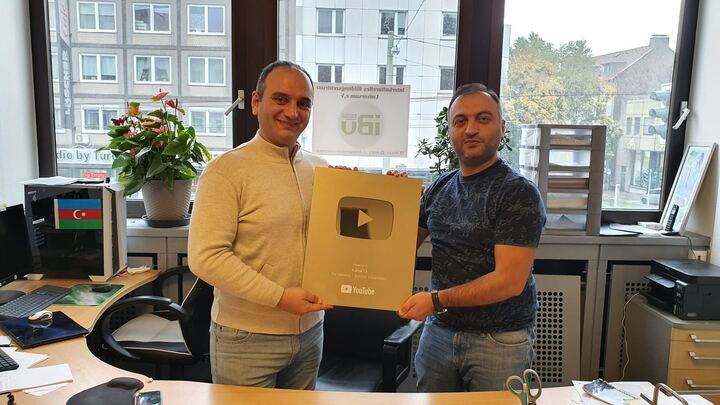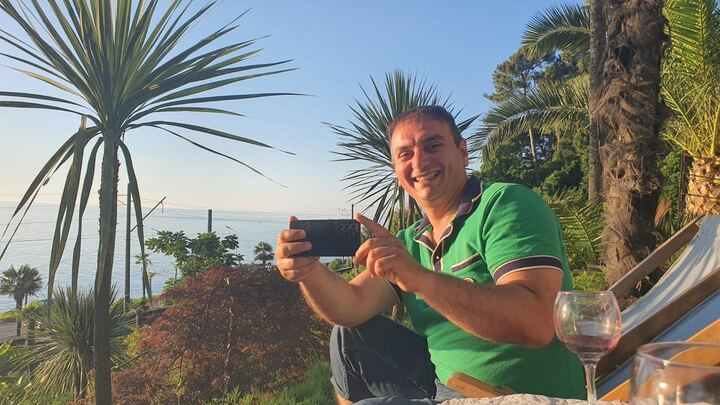A 3-year-old girl in braided pigtails stood between her father, journalist Aziz Orujov, and masked police officers inside their Baku, Azerbaijan, apartment in November 2023.
Dressed in polka-dot pajama pants, she clung to her father’s leg as her mother recorded the scene which was later posted on Orujov’s news service Kanal 13. Orujov lifted her up, kissed her on the cheek and attempted to distract her before officers took him away.
More than a year later, Orujov is still in pretrial detention.
It wasn’t the first time Orujov, 40, was arrested for his work as a journalist, Orujov’s friends and family said.
“Aziz is a brave person despite all the warnings,” Anar Orujov, Aziz Orujov’s brother, said in a phone interview with Capital News Service from exile in Germany.
Orujov’s arrest was part of a recent crackdown on independent journalists and government critics in Azerbaijan ahead of national elections and a series of international events hosted in the country. Since November 2023, at least 19 journalists have been held in detention on charges of currency smuggling, including Orujov and Kanal 13 freelance reporter Shamo Eminov .
Aziz Orujov’s case was sent to court this week, local media reported and his brother confirmed, after officials concluded their investigation into the reporter.
Orujov was first charged with illegal construction and then currency smuggling charges, charges his brother and friends say are bogus and a pretext to stop his reporting. He was building a home in Baku without permits, but in this region, thousands of homes are built without them, according to his lawyer. The journalist is being subjected to retaliatory prosecution due to his work, the lawyer, Bahruz Bayramov, told the Committee to Protect Journalists.
The government attempted to block Kanal 13 on Dec. 11, 2023 — days before they added the currency smuggling charges. The smuggling charges were dropped in early December 2024 following the preliminary investigation, leaving Orujov to still face court for the illegal construction charges.
“The government doesn’t want to hear critical voices,” Zaur Akbar, a human rights defender in Azerbaijan who has known the brothers since 2006, said. “Aziz refused to work with the government. He preferred to be an independent one, as always. That is why he has been arrested.”
The Orujov brothers founded Kanal 13, an independent online Azerbaijani news service, in 2008. Kanal 13, which has over 2 million subscribers on YouTube, often features opposition leaders, experts that disagree with the government and reporting on Azerbaijani government corruption.
Azerbaijan, an oil and natural gas producer, has been ruled for decades by an authoritarian regime led by President Ilham Aliyev whose government’s corruption has been well-documented by international media outlets.
The Aliyev government has closed independent media and implemented laws restricting news coverage. The United States, in its annual Human Rights Reports, is among those repeatedly accusing the regime of arresting journalists unjustifiably.
In a statement to CNS, the Embassy of Azerbaijan in Washington denied Orujov was arrested due to his work as a journalist.
“Understandably, journalism has nothing to do with permissiveness to engage in illegal activities,” the statement said. “If a person is involved in unlawful activities, including illicit financial operations in large amounts, it violates Azerbaijan’s law. Attempts to politicize it go against the very principles of the rule of law and judicial independence.”

Orujov and his brother founded Kanal 13 three years after graduating with a journalism degree from Baku State University. He worked in newspapers, his brother in television, but they wanted to make their own news station to report on the government and to help bring the democratic notion of a free press to Azerbaijan.
The channel quickly became popular.
In 2014, the government began cracking down on non-governmental organizations and free media – including the Caucus Media Investigation Center which the brothers ran together. Anar Orujov fled Azerbaijan for Germany after he found out the center was being threatened for criminal prosecution, where he still lives now and runs the channel.
He repeatedly warned Aziz Orujov he should leave as well. But he wouldn’t listen, Anar Orujov said.
In 2017, Aziz Orujov was arrested for the first time while driving with his wife. He was sentenced to six years for illegal entrepreneurship and abuse of power, but was released in April 2018.
Still, Aziz Orujov was committed to staying in the country to continue his work.
Aziz Orujov was a brave journalist, always ready to video any street action, protests or other incidents happening nearby, his friend Akbar said.
“He wanted to do more, as much as possible, beyond his capacity and his daily schedule,” Akbar told CNS in a Zoom interview from Azerbaijan.
Kanal 13 reported on the widespread torture of Azerbaijani soldiers serving in the western Tartar region. Aziz Orujov is most proud of this work, his brother said.
In 2021, the Organized Crime and Corruption Reporting Project, an international investigative journalism organization based in Amsterdam, discovered that the brothers were targeted by Pegasus, a military-grade spyware that hacks into phones without the owner’s knowledge.
When the brothers found out about the spyware, Anar Orujov said they laughed.
“Let them listen to our conversation…we don’t do anything, like, secretly. What we are planning to do, everything is published online after several days,” Anar said.
In 2022, Aziz Orujov was in a park near his apartment in Baku with his daughter when a stranger approached him. They told Orujov to stop publishing or he would not be able to see his daughter again, his brother said. He also started to receive phone calls and was approached by other strangers in public with similar messages.
Anar Orujov said he again pleaded with him to leave the country, but his brother refused.
“We need to manage the channel inside of the country, and if you are not inside of the country, personally, you cannot encourage others to work bravely as a journalist,” Anar Orujov recalled his brother telling him.
In October 2023, Aziz Orujov visited his brother for the last time before the arrest. He went to a human rights conference in Poland and then stayed with him in Germany for about a week.
Again, Anar Orujov tried.He told his brother about recent crackdowns on journalists and explained that by working for a news service that includes opposition voices, Aziz Orujov would always be at risk.
“He was somehow calm. He understood the situation,” Anar Orujov said.
He promised he would think about moving, but Anar Orujov knew his brother only said this to comfort him.
Then came the arrest.
Police searched his family apartment and the Kanal 13 offices. Orujov can be seen in one Kanal 13 video raising his fist to cameras as he was led out of a van by police officers.
“Authorities are using them as pawns in some kind of game that they’re trying to play, either geopolitical or with their own population,” Karol Łuczka, the Eastern Europe monitoring and advocacy officer at the International Press Institute, said in a Zoom interview from Austria. “Seeing journalists used like this, even if they are released at a later stage, is obviously appalling for us.”
Many journalists in the country have gone into self-imposed exile, reporting on Azerbaijan from neighboring countries – Kanal 13 is an exception to this rule, will reporting still done from within the country.
Arzu Geybulla, an Azerbaijani journalist working from Istanbul, told CNS in a Zoom interview:
“It’s almost like speaking into a void. Yes, we write about them, yes, we document the abuse… but we also know that at the end of the day, very little will likely happen.”
Geybulla and other people working on Orujov’s release were hopeful that there could be a performative release of journalists when Azerbaijan hosted November’s United Nations climate conference, COP29, and news outlets around the world published stories about imprisoned reporters and human rights abuses. But nothing changed.
Orujov’s mental and physical health is declining in detention, his brother said. He has been diagnosed with a kidney disease, depression and an issue with blood circulation to his brain.
His family is permitted to visit him for an hour almost once a week. Sometimes, his daughters – now 2 and 4 years old – visit too.
Even after Aziz Orujov is eventually freed, his brother still isn’t sure if he will leave or end his pursuit of uncensored journalism.
“Aziz decided to stay and to continue until the end,” Anar Orujov said. “I don’t know if he will leave the country even after his release or, he will decide again to stay in the country and to keep continuing his work.”


You must be logged in to post a comment.